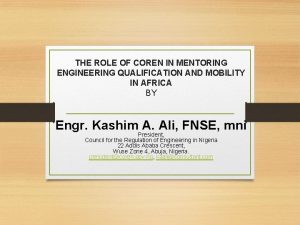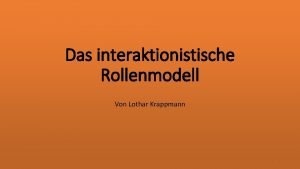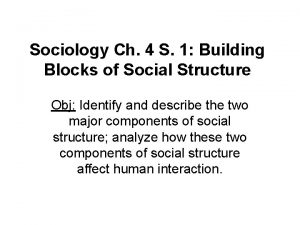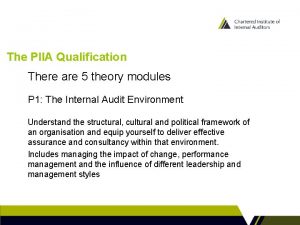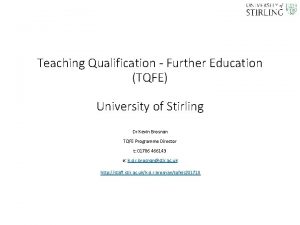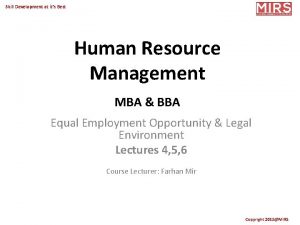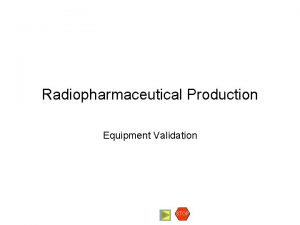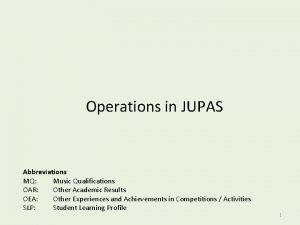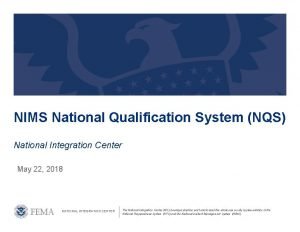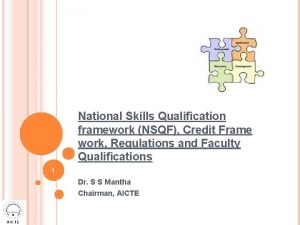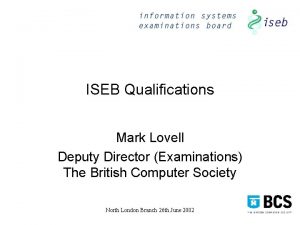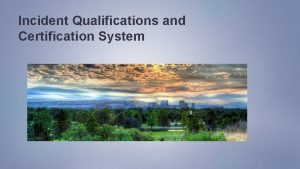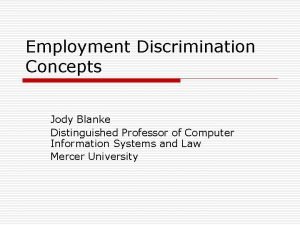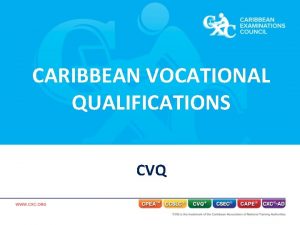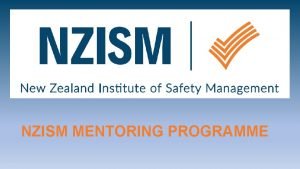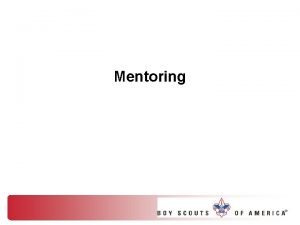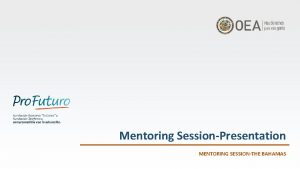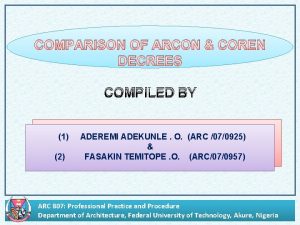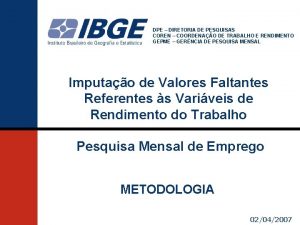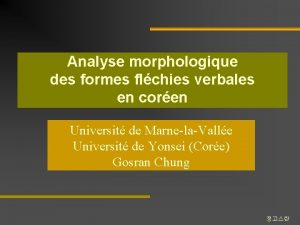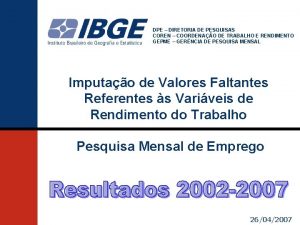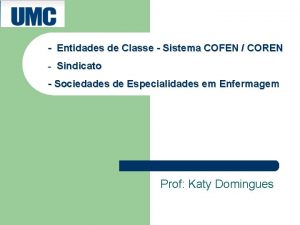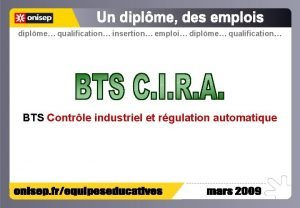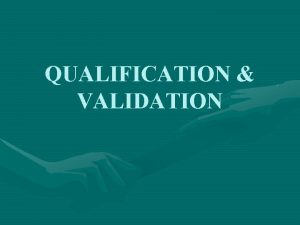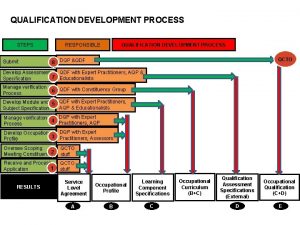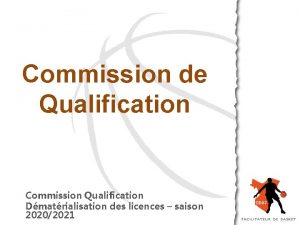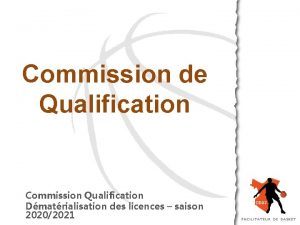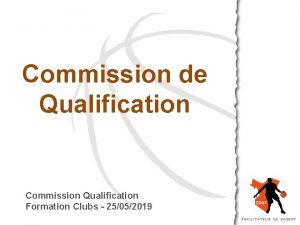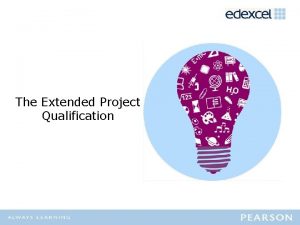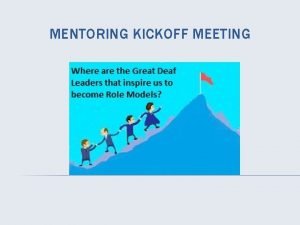THE ROLE OF COREN IN MENTORING ENGINEERING QUALIFICATION
























- Slides: 24

THE ROLE OF COREN IN MENTORING ENGINEERING QUALIFICATION AND MOBILITY IN AFRICA BY Engr. Kashim A. Ali, FNSE, mni President, Council for the Regulation of Engineering in Nigeria 22 Addis Ababa Crescent, Wuse Zone 4, Abuja, Nigeria. president@coren. gov. ng, kaali@consultant. com

Table of contents 1. 0 INTRODUCTION 2. 0 OVERVIEW OF COREN ROLE IN TECHNICAL COLLEGES 3. 0 OVERVIEW OF COREN ACCREDITATION OF ENGINEERING QUALIFICATIONS 3. 1 PRE-ACCREDITATION OR RESOURCE INSPECTION VISITATION 3. 2 ACCREDITATION VISITS 4. 0 BMAS DOCUMENT 5. 0 CERTIFICATION OF ENGINEERING QUALIFICATIONS 6. 0 CONTINUING PROFESSIONAL DEVELOPMENT 7. 0 TRANSPORTABILITY OF QUALIFICATIONS 8. 0 CONCLUSION

1. 0 INTRODUCTION • Council for the Regulation of Engineering in Nigeria, COREN, was established as a statutory organ of the Federal Government of Nigeria by Decree No. 55 of 1970 as amended by Decree 27 of 1992, now Engineers (Registration etc) Act, CAP E 11, 2004, which empowers it to: • Regulate and control engineering practice in Nigeria in all aspects and ramifications; • Ensure that engineering is practised by industry, government and professionals according to acceptable and prescribed standards and abiding by the ethics and cannons of the profession;

Ensure appropriate training and use of engineering personnel and execution of engineering jobs by: (a) Ensuring that only registered engineering personnel are involved in the execution of engineering jobs; (b) Ensuring that only registered engineers head engineering departments and units; (c) Ensuring that only registered and licensed engineering firms are allowed to undertake engineering jobs; (d) Ensuring that opportunities for ‘Continuing Professional Development’ are provided for engineering personnel; (e) Ensuring that without proper registration with COREN, engineering personnel do not progress or function beyond legally prescribed levels.

The development of engineering manpower in Nigeria is in three phases • Education • Training • Experience With the mandate, COREN is involved in the Education and Training phase in the making of engineering personnel. This way, COREN prescribes standards and accredits academic programmes the products of which are eligible for registration after they acquire further necessary practical training under the supervision of professionally registered engineers or other registered engineering personnel.

2. 0 OVERVIEW OF COREN ROLE IN TECHNICAL COLLEGES • COREN in collaboration with NBTE jointly supervise and regulates through accreditation exercises, the programmes offered by technical institutions at secondary and post-secondary school levels. (a) Capacity building for Technical Colleges instructors. (b) Complement technical colleges with work schools to rain products of junior or senior secondary schools to acquire skills to become craftsmen or technicians (c) Project Skills acquisition programmes

3. 0 OVERVIEW OF COREN ACCREDITATION OF ENGINEERING QUALIFICATIONS 3. 1 Pre-Accreditation or Resource Inspection Visitation • From the various sections of the COREN Act, the procedure for establishing Engineering programmes has been made clear. • Based on national manpower requirements, the National Universities Commission, NUC, approves an Engineering Programme to be run in a Universities while the National Board for Technical Education, NBTE, does same for Polytechnics, Monotechnics and Technical Colleges.

• COREN then carries out a Pre. Accreditation or Resource Inspection visitation to the Engineering programme and based on the findings, approves its commencement. It is COREN that determines whether the Engineering programme has adequate facilities to commence teaching and learning of the programme. It is therefore illegal to commence an Engineering programme without initial approval by COREN.

3. 2 Accreditation Visits • COREN usually carries out a pre-accreditation visit and subsequently an Accreditation exercise. The Pre-Accreditation visit is usually an opportunity for the institution to get professional advice from COREN on all aspects of the programme that need to be put in place. • An accreditation exercise is thereafter conducted, after which a university engineering programme could be granted a partial accreditation or a full accreditation status. On the other hand a non-accredited status falls on those without the minimum requirement. Two years after the initial approval, COREN visits again for the normal accreditation. • During the exercise, the COREN team meets with a cross section of the students for mentoring interactions, among other constructive engagements.

4. 0 BMAS DOCUMENT • A Government regulator in Engineering practice; COREN came up with Benchmark Minimum Academic Standard and Accreditation Scoring Criteria for Engineering Programmes in Nigeria (BMAS) • This takes care of the general requirements for engineering programmes to be accredited, the specific requirement for each engineering discipline and COREN Accreditation score sheet. • To ensure that the training of engineering personnel is adequate and sufficient in meeting the challenges of industry, COREN insist that all Engineering programmes are made to meet the minimum requirements as stated in the Benchmark Minimum Academic Standard and Accreditation Scoring Criteria for Engineering Programmes in Nigeria.

BMAS DOCUMENT – Con’td • The BMAS is a profound effort of COREN to standardize Engineering curricula in line with best practise and to facilitate mobility. To achieve this objective, COREN presented its BMAS to ISTIC which in turn subjected it to review by FEAIP and UNESCO. • The High Level Forum being held in Nigeria today is the result of this effort. COREN has become the flagship on Engineering mentoring not only for Nigeria Engineering personnel but may soon be for most African countries.

5. 0 CERTIFICATION OF ENGINEERING QUALIFICATIONS • COREN certifies engineering personnel in four cadres namely Engineers, Engineering Technologists, Engineering Technicians and Engineering Craftsmen through its Registration mandate. • Engineering personnel must have undergone training in an engineering programme that is accredited by the host country before they can be certified in any engineering cadre. • Also in certain cases, the qualification can be subjected to an assessment by viewing the transcript to ensure that the relevant engineering courses were taken.

CERTIFICATION OF ENGINEERING QUALIFICATIONS – Cont’d • Where a Qualification is unique or requires further scrutiny it is deliberated upon by Special Case Committee which is made up of both academia and professionals in engineering for proper placement. Relevant mentoring is offered to affected persons through the process. • By these COREN ensures that Engineering Qualifications meets international standards.

6. 0 CONTINUING PROFESSIONAL DEVELOPMENT • Continuing Professional Development (CPD) is a fundamental part of any career that ensures that professionals are up to date, by constantly learning and improving to develop skills and stay at the cutting edge of the industry. • COREN carries out CPD Programmes because of its importance to the growth of the Profession. Over time the CPD programme has ensured that Engineering personnel obtain maximum benefits which include:

CONTINUING PROFESSIONAL DEVELOPMENT – Cont’d • Capabilities to keep pace with the current standards of others in the same field. • Maintaining and enhancing the knowledge and skills they need to deliver on professional service to the customers, clients and the community. • Acquiring knowledge to stay relevant and up to date. To be more aware of the changing trends and directions in the profession. The pace of change is probably faster than it’s ever been – and this is a feature of the new

• Ensuring that Engineers continue to make a meaningful contribution to their team. To become more effective in the workplace. This assists them to advance in their career and move into new positions where they can lead, manage, influence, coach and mentor others. • Ensuring that Engineers stay interested and interesting, as experience is a great teacher. • CPD helps to advance the body of knowledge and technology within the engineering profession

7. 0 TRANSPORTABILITY OF QUALIFICATIONS • Through the collaboration of all stakeholders, COREN works in ensuring effective engineering education processes of high quality in Nigeria. Transportability of qualifications will be critical in the future not only for academic credit but potentially for accreditation as is currently being developed. • The transportability of qualifications has long been an issue perceived by students. However, means of improving the mobility both among AU Countries and also internationally have been identified as follows

• Enhancing the ability of engineering faculty, students and practitioners to understand the varied cultures of the world and work effectively in them • Involving a number of African Universities to offer jointly supervised Ph. D qualifications leading to a doctoral degree that is recognized by participating countries. • Establishing cooperation and mobility program that supports joint postgraduate programs, researchers and university staff as well as joint projects to enhance higher education worldwide.

• Recognised courses could also be hosted from a consortium of higher education institutions from across the Africa regions. • Linking with World Federation of Engineering Organisations (WFEO) as they do have a policy on the mobility of professional engineers, “WFEO Policy on Accreditation of Courses and Mobility of Engineering Professionals” (Greenwood, 2008. The policy was adopted later in 2009 )

8. 0 CONCLUSION • COREN has been promoting internationally- recognized standards in all engineering institutions and would like to see mobility between countries in Africa increase as they all rise to the level of international universities and to meet need based opportunities. We believe Universities in Africa need to harmonize standards on ways of learning, teaching, curricula improvement, and executive faculty trainings. This forum is a great opportunity to take the lead for this initiative and help pilot countries as the need exists to link with all African countries to this initiative.

CONCLUSION CONT’ D • During this forum it is expected engineering experts, academicians and focal persons from various national and international entities will discussed gaps and opportunities and the development of a road map for engineering qualifications standardizations in Africa.

THANK YOU

References • J. F. Ade Ajayi, History of the Nigerian Society of • • Engineers, The Nigerian Society of Engineers, 1995. Dapo F. Asaju and Alvan. Ewuzie, Bolude. Oyebolu: Life and Ministry of a Nigerian Engineer, University Press plc, Ibadan 2009. M. O. Olaniyan, Private Communication, 25 th October, 2015. S. Honda, H. Kato and Y. Shimoda, South-South and Triangular Cooperation for Sub-Sahara Africa’s development – With special emphasis on knowledge exchange nad co-creation. https: //jica-ri-jica. go. jp/publication/asvets/TICAD_JICARI-1300 -Chapter 13. pdf

• Lee Yee Cheong, Proposal for CAE – Tsinghua Engineering Education Center on Cooperation with ISTIC, st August 2015, Kuala Lumpur. • Nick Clark, “The Bologna Process as a Model for Regional Integration”, http: // wenr. wes. org/2014/06/thebologna-process-as-a-model-for-regi… accessed on 30 th September, 2015. • Iromi. Dharmawardhane, “South Asia and Latin America: A Powerful Friendship to be Nurtured”, Paper presented to the second global South International Studies Association’s global South Caucus and Singapore Management University, January 8 – 10, 2015.
 Coren certification
Coren certification Coren sp
Coren sp Web role in azure
Web role in azure Soziale identität krappmann
Soziale identität krappmann Statuses and their related roles determine the structure
Statuses and their related roles determine the structure 5f welding position
5f welding position V model qualification
V model qualification Piia qualification
Piia qualification Tqfe qualification
Tqfe qualification Adit exam
Adit exam Bona fide occupational requirement
Bona fide occupational requirement Equipment qualification fda
Equipment qualification fda Kwalipikasyon at kapangyarihan ng pangulo
Kwalipikasyon at kapangyarihan ng pangulo Jupas ole sample
Jupas ole sample Refeeding syndrome electrolytes
Refeeding syndrome electrolytes Nims integration center
Nims integration center Level-6 of national skill qualification framework
Level-6 of national skill qualification framework Tabs for leaders book army dlc
Tabs for leaders book army dlc Iseb qualification
Iseb qualification Incident qualification and certification system
Incident qualification and certification system Bona fide occupational qualification
Bona fide occupational qualification Cvq portfolio sample
Cvq portfolio sample P number in welding
P number in welding Dtms weapons qualification
Dtms weapons qualification Herbalife millionaire team earnings
Herbalife millionaire team earnings
